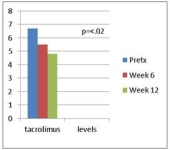Treatment of Post Transplant Hepatitis C (HCV) with Direct-Acting Antiviral (DAA) Agents May Improve Liver Function but Does Not Lead to an Increase in Liver Rejection
Surgery, Hartford Hospital, Hartford, CT.
Meeting: 2018 American Transplant Congress
Abstract number: 63
Keywords: Immunosuppression, Rejection
Session Information
Session Name: Concurrent Session: Liver: Immunosuppression and Rejection
Session Type: Concurrent Session
Date: Sunday, June 3, 2018
Session Time: 2:30pm-4:00pm
 Presentation Time: 2:54pm-3:06pm
Presentation Time: 2:54pm-3:06pm
Location: Room 6B
Previous studies have suggested that with the use of with (DAA) agents to treat post transplant (HCV), there has been an increased incidence of liver graft rejection. This increase may be due to an improvement in liver function resulting in better metabolizing of immunosuppressive drugs resulting in a decrease in blood levels or immunomodulating effects of the HCV virus. We looked to see what the effects of treating HCV post liver transplant with (DAA) agents on immunosuppressive drug levels. Patients treated with interferon were excluded from the study. Through a retrospective chart review, patients' demographics, date of transplant, date of HCV recurrence, pre and post treatment viral loads were recorded. Immunosuppressive regimens and treatment regimens were noted. Tacrolimus (TAC), cyclosporine(CYA), or sirolimus(SIR) levels were measured pretreatment, 6 weeks into treatment, and post-treatment. Post-treatment viral load as well as biopsy proven rejections was recorded as well. Following data collection, statistical analysis was done using a paired t-test. Results: 54 patients were treated with post transplant for HCV with DAA regimens. All 54 patients achieved SVR. The majority of patients were treated with TAC (41), while 9 received CYA and 4 SIR the main immunosuppression, CYA and SIR levels dropped but were not statistically significant. There was a significant decrease in TAC levels at the end of treatment (6.7 vs 4.8,p<0.02). Four patients had their dose increased. Four out of 54 patients had biopsy proven rejection (0.074) but only one was associated with a significant decrease in drug levels. The decrease of TAC level may be explained by improved hepatic function leading to enhanced drug metabolism, possibly due to the eradication of virus. While our incidence of rejection (0.07%) was low, immunosuppressive dosages and TAC levels should be monitored closely to prevent this occurrence. Thus, our study suggests that treatment of Hepatitis C may increase metabolism of TAC but does not lead to an increase in liver rejection.
Four patients had their dose increased. Four out of 54 patients had biopsy proven rejection (0.074) but only one was associated with a significant decrease in drug levels. The decrease of TAC level may be explained by improved hepatic function leading to enhanced drug metabolism, possibly due to the eradication of virus. While our incidence of rejection (0.07%) was low, immunosuppressive dosages and TAC levels should be monitored closely to prevent this occurrence. Thus, our study suggests that treatment of Hepatitis C may increase metabolism of TAC but does not lead to an increase in liver rejection.
CITATION INFORMATION: Sheiner P., Mello N., Baixauli G., Einstein M., Rochon C., Kwon Y., Bejon M. Treatment of Post Transplant Hepatitis C (HCV) with Direct-Acting Antiviral (DAA) Agents May Improve Liver Function but Does Not Lead to an Increase in Liver Rejection Am J Transplant. 2017;17 (suppl 3).
To cite this abstract in AMA style:
Sheiner P, Mello N, Baixauli G, Einstein M, Rochon C, Kwon Y, Bejon M. Treatment of Post Transplant Hepatitis C (HCV) with Direct-Acting Antiviral (DAA) Agents May Improve Liver Function but Does Not Lead to an Increase in Liver Rejection [abstract]. https://atcmeetingabstracts.com/abstract/treatment-of-post-transplant-hepatitis-c-hcv-with-direct-acting-antiviral-daa-agents-may-improve-liver-function-but-does-not-lead-to-an-increase-in-liver-rejection/. Accessed July 9, 2025.« Back to 2018 American Transplant Congress
